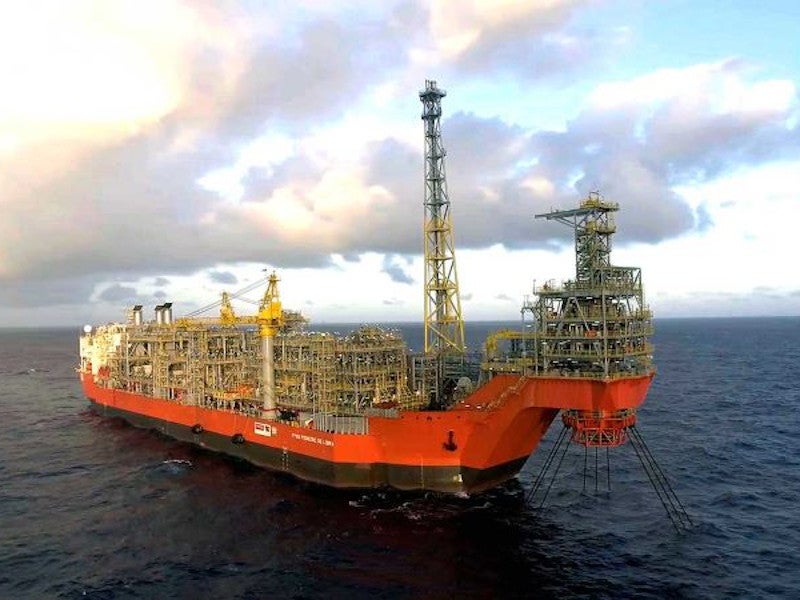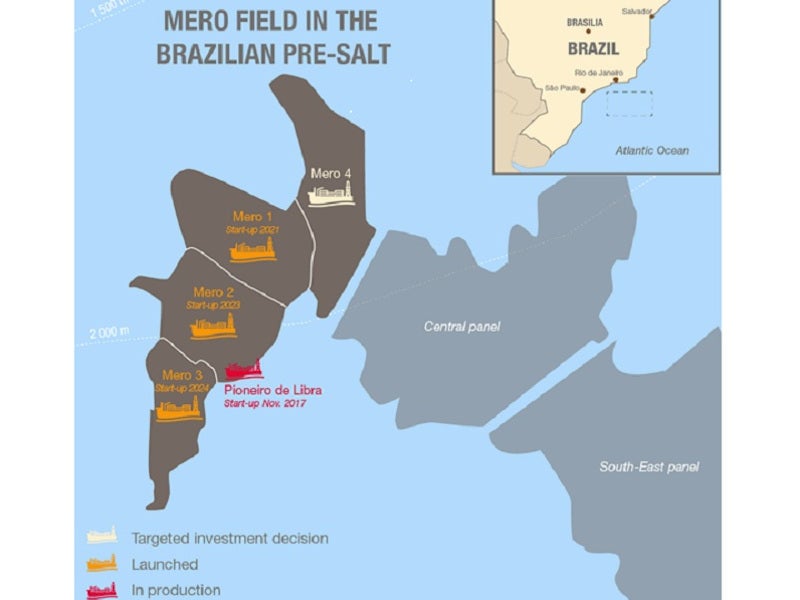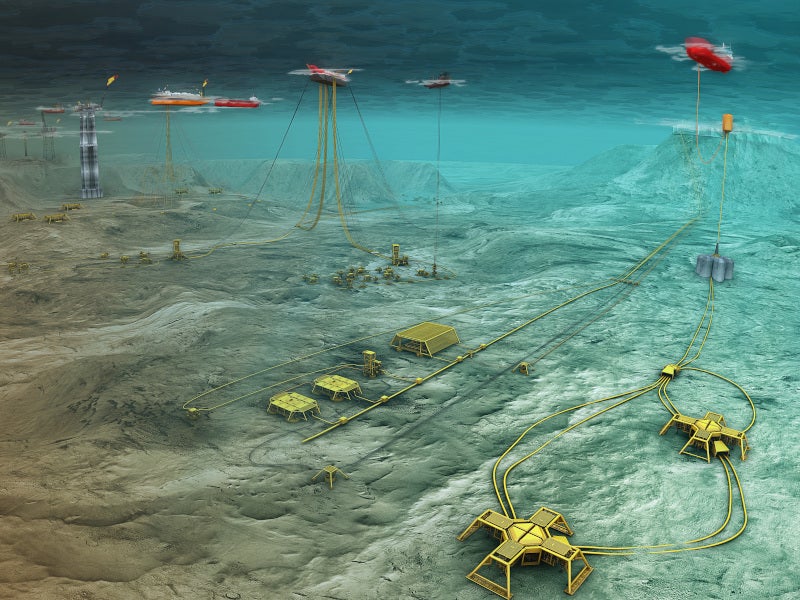Mero is a giant deep-water oil field development in the pre-salt Santos Basin, Brazil involving multiple floating production, storage, and offloading units (FPSOs).
Operated by Petrobras, the field produced first oil with the start of an early production system in November 2017. The field is estimated to hold recoverable oil reserves of 3.3 billion barrels.
Discovered in 2010, the Mero field forms part of the Libra block, which is being developed by a consortium comprising Petrobras (40%), Total (20%), Shell (20%), and Chinese oil and gas firms China National Offshore Oil Corporation (10%), China National Petroleum Corporation (10%) and the Brazil state-owned Pré-Sal Petróleo (PPSA).
The Libra consortium entered into a 35-year production sharing contract with the Brazilian authorities to operate and explore the Libra block in December 2013. The production sharing contract is managed by the PPSA.
The Libra consortium plans to deploy four new FPSOs, excluding the early production system, in the Mero field to produce more than 600,000bpd of oil.
Location
The Mero project is located in the north-western portion of the Libra block in the Santos Basin, approximately 180km south of Rio de Janeiro in the Atlantic Ocean, Brazil.
The Libra block is spread over approximately 1,548km2 in approximately 2,100m-deep waters.
The Mero deep-water oil field has high-yield carbonate reservoirs with the oil columns thickness estimated to be up to 400m.
Early production system
The FPSO Pioneiro de Libra which was deployed in the Mero field for extended well tests and early production system commenced operation in November 2017. The processing capacity of the FPSO is 50,000 barrels per day (bpd) of oil and four million cubic metres (mcm) of associated gas a day.
The extended well tests enable the Libra consortium to study the reservoirs and wells. The findings in the early production phase will help in the field development.
The cumulative production from the FPSO Pioneiro de Libra stood at 22.8 million barrels of oil by the end of December 2019.
Mero 1
The final investment decision for the development of the Mero-1 area was reached in December 2017. The FPSO Guanabara to be deployed in the Mero 1 area is currently under construction.
The processing capacity of the FPSO will be 180,000bpd of oil and 12mcm of gas a day. The water injection capacity of the FPSO will be 225,000bpd, while the oil storage capacity will be 1.4 million barrels.
Scheduled to go on stream in 2021, the FPSO is planned to connect with up to 17 wells.
Mero 2
The Mero-2 project development was sanctioned in June 2019. The FPSO Sepetiba to be deployed for Mero-2 will have a capacity to process 180,000bpd of oil and 12 million cubic metres of gas a day. The water injection capacity of the FPSO will be 250,000bpd while the crude storage capacity will be 1.4 million barrels.The weight of the FPSO topside modules will be approximately 33,000 tonnes (t)
The Mero-2 FPSO is also planned to be connected with up to 17 wells and it is expected to commence operations in 2023.
Mero 3
The final investment decision for Mero-3 development was reached in August 2020. It will be developed through the FPSO Marechal Duque de Caxias, which will have a capacity to process approximately 180,000bpd of oil and 12mcm of gas a day. It is expected to start operations in the first half of 2024.
The Mero-3 development will comprise eight production and seven water and gas injection wells.
The high-pressure separation (HISEP) technology developed and patented by Petrobras for the separation and reinjection of associated gas with high carbon dioxide content, will be tested on a pilot basis in the Mero-3 area.
Contracts awarded
A joint-venture between Odebrecht Oil & Gas (OOG) and Altera Infrastructure (formerly Teekay Offshore) was awarded a contract for the charter and operation of the FPSO Pioneiro de Libra for a period of 12 years in October 2014. The FPSO was built in the Jurong shipyard in Singapore.
Japan’s Modec was contracted for the supply, charter and operations of the FPSO Guanabara as part of the Mero-1 project in December 2017. The FPSO will be chartered for a period of 22 years.
SBM Offshore was contracted to charter and operate the FPSO Sepetiba for a period of 22.5 years as part of the Mero-2 project in December 2019.
Malaysia’s MISC signed a Letter of Intent to charter and operate the Marechal Duque de Caxias FPSO for a period of 22.5 years as part of the Mero-3 project in August 2020.
TechnipFMC was awarded the subsea engineering, procurement, construction and installation (EPCI) contract for the Mero-2 project in August 2020. The contract scope includes EPCI of the infield rigid riser and flowlines for production and water alternate gas wells.
TechnipFMC was also awarded a similar subsea EPCI contract for the Mero-1 project in February 2019.
Benthic, a part of Acteon group, secured a contract to provide geotechnical site investigation services for the Mero field in August 2020. The contract scope includes in-situ testing, sampling, and seismic cone testing at 26 locations of the Mero field. Benthic’s PROD3 seabed drilling and geotechnical testing system will be used for field investigation.
Aker Solutions secured a contract to provide a subsea production system and related services for the Mero-1 project in October 2018. The subsea production system will include 12 vertical subsea trees, four subsea distribution units, and three topside master control stations for the FPSO Guanabara.
Halliburton was contracted for well construction and completion services for the Mero field development in July 2019.





